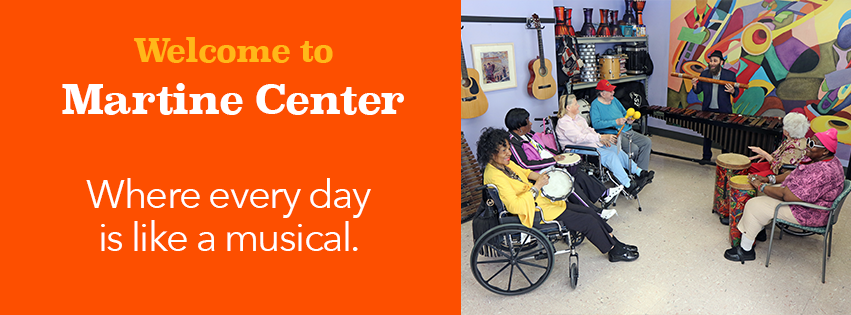As the halls of Martine Center’s third floor fill with a familiar tune, one can hear a small chorus singing along to Frank Sinatra’s classic “New York, New York.” While the same scene may be playing out at nursing homes across the country, the music at Martine Center sounds just a bit better knowing that the third floor is comprised almost exclusively of residents with dementia.
Marlon Sobol, sitting behind a baby grand piano, plays Sinatra’s melody with one hand, while using the other to reassure a resident that he is not falling from his wheelchair. Sobol is Martine Center’s full-time board certified music therapist, something that is rarely found in rehabilitation and nursing facilities.
“I do four programs a week with the dementia unit. Because language and the verbal capabilities have been impaired, music and sensory touch, real primal interactions, are the things that are still very reachable” said Sobol.
Using music as a conduit, Marlon is able to establish a line of communication with individuals who have almost lost their sense of orientation to the world around them. In a short 30 minute program, he is able to bring even the most distressed audience members into a more relaxed and almost enraptured state of mind. Whether it’s through singing along, call and response, or even triggering a youthful memory, Sobol is able to penetrate the fog of dementia in a way that few others can. Sobol described his interactions with the resident with whom he was holding hands.
“So here’s a gentleman with mid stage dementia who’s not oriented to where he is. He came into today’s program not knowing the time, the place, person. The first intervention was taking his hand, letting him know that he was safe and secure and not going to fall,” Marlon said. “Once that safe place is created, then he started singing along to the familiar repertoire. And that’s where the relationship comes in. I know there’s certain songs, because I have gotten to know him as a musical person. After this he was singing, he was following instructions, he was engaging, and he was having less verbalizations of disorientation. So that’s pretty drastic than what we had witnessed before the session. And there’s hundreds of other stories like that.”
While many facilities will provide occasional music therapy sessions for their residents, Martine Center takes it a step further. As a full-time employee of Martine Center, Marlon is able to forge individual relationships with residents. He understands their histories and personalities. This allows for more effective and personalized interaction during therapy sessions. Marlon uses the personal relationships he’s forged with the residents to tailor his repertoire for the best results.
“So generally, when there’s a song that revolves around a very significant time in their life, like a wedding song, or a song they used to dance to at a night club they regularly visited, I think the association is an automatic. It comes. For me when I hear a song, it brings me back to the time when I first heard it. The feeling I got when I first heard it. Maybe they don’t quite remember the place they were at, but they certainly remember the feeling they had when they first heard it and I think that’s very much alive. It’s really amazing that with the snap of a finger, you can transport someone to a feeling of being young and vibrant.” Sobol said.
For those who suffer from dementia, there is nothing more powerful than being able to reclaim some of the connections to the world that have been lost. Martine Center’s music man is helping residents reclaim those connections, one song at a time.






